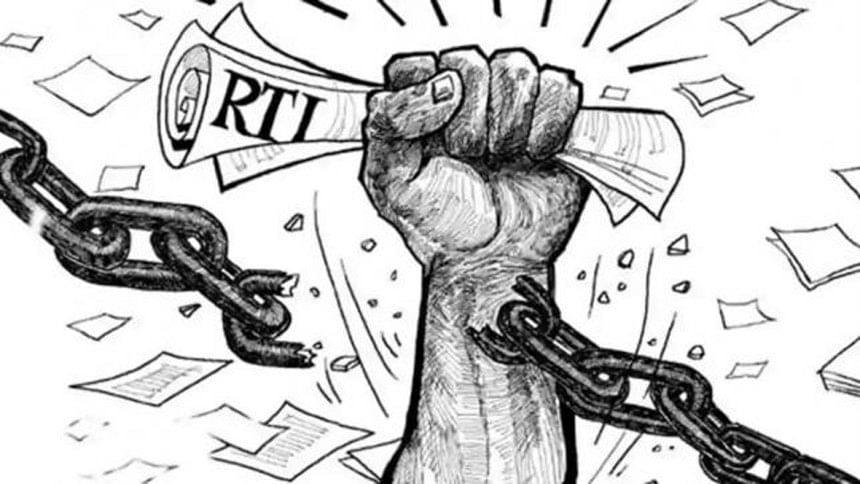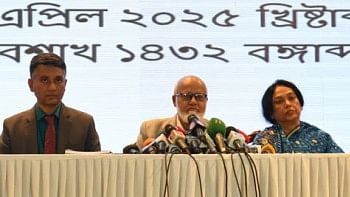RTI requests and the reality on the ground

As activists, we have filed RTI request to almost all kinds of offices, from union parishad, the lowest level of administration, to the Prime Minister's Office (PMO), the highest level of administration. Here are some examples of how the various government offices responded to these applications.
Let's start with the PMO. Any Indian can know the details of their PM's foreign trips online. But there is no such mechanism in Bangladesh. In 2017 we filed an RTI request to know how many people travelled with the PM during her annual visits to the UN office in New York, during 2010-2015, how many of them had office order to serve the duty, how many of them had no office order, those who had no office orders, their short bios and expenses incurred in each tour. The response was documents containing unnecessary information with nothing on the office orders, expenses, and the identities of companions who were not on duty (See decision 03/2017).
Some applicants sought information from Bipulasar Union Parishad. They didn't receive information and that's why they filed complaints repeatedly. But the information commission asked for the applicants' police verification and after receiving police verification, issued a decision where they declared that the applicant had received the information sought (See decision 254/2017 and 132/2018).
We had sought monthly meeting minutes of the information commission (IC) from the year 2018 till date. IC wrote that some decisions had been given saying that the applicants had received information although they hadn't. We filed an RTI application to IC to know on what basis they wrote the decision that the applicant got the information and asked for a copy. The IC could not respond to these queries.
Article 9(4) says, "Notwithstanding anything contained in sub-section (1) and (2), if a request made under sub-section (1) of section 8 is relating to the life and death, arrest and release from jail of any person, the officer-in-charge shall provide preliminary information thereof within 24 (twenty-four) hours." On many occasions and TV talk shows, commissioners were asked by journalists and others in how many cases they helped to retrieve information for the victim's family within 24 hours. They completely denied that anyone had filed such complaint to them. But we had filed this complaint and didn't get information in time under this section (See decision 91/2018).
We asked a question to a commissioner if any authority doesn't provide any information within 24 hours, what can a citizen do. They replied that they had to wait for 20 days, then file an appeal and wait for another 10 days, then complain to the IC. On the contrary, CIC of Nepal had informed us that they have called both parties immediately after 24 hours of receiving such complaints.
There are other problems to filing RTI complaints. The first is that the name and designation of the designated officer (DOs) is not available. If DOs name is not written properly, the IC rejects the application. Although IC's website contains name and designation of DOs, in 95 percent cases the officer named in the website is not in the stated position. After 10 years of the RTI Act there are still some organisations that do not have a DO, but according to the Act, a DO has to be recruited within 60 days. Our highest judicial authority, the Supreme Court of Bangladesh, has no DO. No citizen or practitioner can file RTI to get information from there. When someone approached the IC to know the name of the DO of Supreme Court, they gave the name of a person who had already retired.
Another hurdle is knowing when a hearing is to take place. Previously, an applicant would get a call from the IC the day before the hearing. This call would help the person filing the request in case a summons letter was somehow missed. But that is no longer the case (See decision 45/2019). If the applicant is absent, the IC dismisses the case. In 2018, half the cases were dismissed on the ground that the applicant was absent. On the day of the hearing, defaulted DOs are entertained as guests, whereas commissioners reprimand applicants and ask unnecessary and irrelevant questions.
So far,only 15-20 decisions have been written with proper reasoning as per compliance with RTI Act 2009. From 2018, not a single decision has been found which has been written and explained as per legal terms of the RTI Act 2009. In certain cases, commissioners have directed DO to supply information within 10-15 days but wrote in their decisions that the applicant has already received information. They have also written in the decision that the applicant has said that they have received the information.
There are problems with the recruitment of commissioners also.All commissioners are supposed to be recruited as prescribed by a committee which was formed under article 14(1) of the Act. But the selection process is not transparent. Article 15(5) says, "Subject to the provisions of this section, the Chief Information Commissioner and the Information Commissioners shall be appointed from amongst the persons with broad knowledge and experience in law, justice, journalism, education, science, technology, information, social service, management, or public administration." To ensure the quality of each candidate as per the act, we don't know what type of steps the selection committee had taken to appoint candidates.
According to complaint no 93/2013, IC had imposed punishment on the applicant instead of DO. According to complaint no 132/2018, the commission had issued police inquiry against the applicant. According to complaint no 60/2016, the commission had asked the applicant the reason for seeking information.Although there is no such provision in RTI Act to conduct hearing in presence of only one party—the applicant, IC did this for a couple of years. After filing a writ petition (WP), single party hearing was challenged in high court and has now stopped.
The legal term "sub judice" is wrongly explained. The Farooq commission termed a lawyer's letter as sub-judice. According to 7(k) "any matter pending before any court of law and which has been expressly forbidden to be published by any court of law or tribunal or the disclosure of which may constitute contempt of court". The words "forbidden to be published by any court" are very important. According to WP 9380/2014, high court had directed stay order on some information on the 29th BCS. But now if any BCS examinee seek any information for other BCS exams, PSC refer to this WP and the information is denied. When an examinee approaches IC, they reject it on "sub-judice" ground.
A few years back, IBA of Dhaka University took an exam of already recruited upazila election commission officers. Single digit officers proved themselves fit for their position out of more than 100. Only those who passed survived, others had to quit. An open book written exam may be taken before recruiting commissioners.
An idle CIC and activist
Shailesh Gandhi was an Indian former CIC who had taken a salary of one rupee. He had recruited some students from various fields as interns and they sat in the hearing room with laptops. Thus he spent his remaining salary as remuneration to interns. At the time of hearing, students wrote decisions simultaneously. When the hearing ended, Mr Gandhi had requested both parties to wait for 20 mins in the waiting room. During this time, he scrutinised the decision, signed it and handed it over to both parties.
After retirement, he filed RTI requests, attended training sessions for interested citizens and writes on loopholes regularly in social and mainstream media. We had asked for information to IC whether any former commissioners file any RTI, and if so, to provide us a copy. They replied negatively.
Unfortunately, we have neither found such a CIC nor active activist in Bangladesh.
In Bangladesh, IC is unable to retrieve information from organisations like PSC, Buet, UGC, Bar council, Thana, NHRC, railways and many more. Although the commission has enough power to take action both by compensating DOs, by giving reparation to deprived complainants, and recommending punishments for errant DOs, they do nothing. IC approves time petition for DOs multiple times, but rejects the same for applicants. IC is impartial to fine fourth class DOs, they don't take action against DOs whose designation is higher.
In Sri lanka, There is no provision to fine a DO. But when a DO cannot supply information on a citizen's request, it must be published in the mainstream media and that DO is termed as a "corrupt" officer. In India and Sri Lanka, mainstream media publish the news on RTI with great importance. In 2018, on the eve of RTI day, editors organisation "Sampadak Parishad" in a meeting, had promised to allocate a page and publish the news on RTI regularly. So far that has not materialised either.
Biplob Karmakar is Muktomona writer and RTI activist. Sreedham Karmakar is a social worker and RTI activist. Email: [email protected]

 For all latest news, follow The Daily Star's Google News channel.
For all latest news, follow The Daily Star's Google News channel. 



Comments